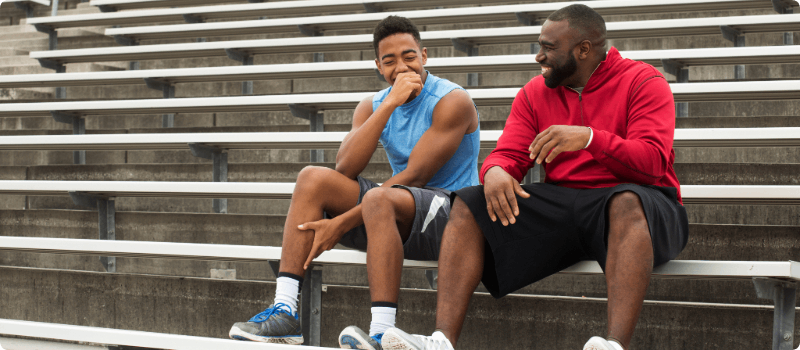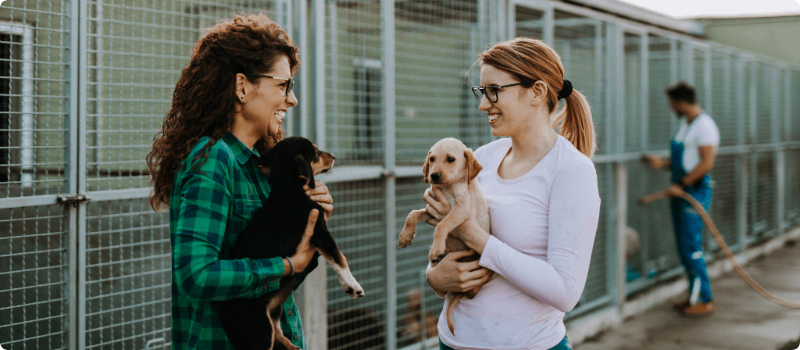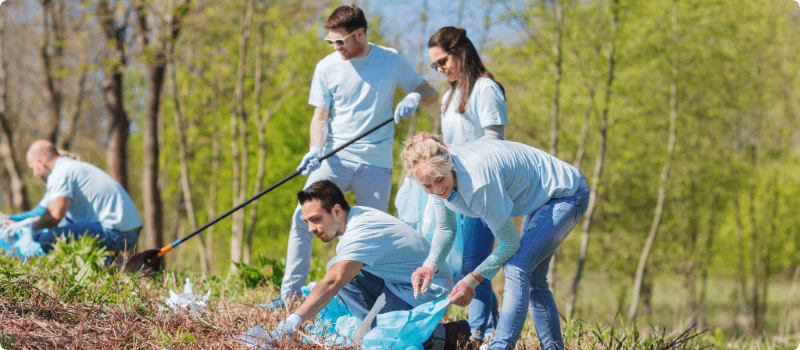5 steps to becoming a youth mentor
Updated October 8, 2024 . AmFam Team
Love kids and want to make a difference in your community? You know the old saying that “it takes a village to raise a child.” Well, you can be part of that village when you volunteer as a youth mentor.
A youth mentor is someone who inspires, supports and guides a child. They provide advice, care and new perspectives to children who wouldn't otherwise be exposed to these things. In short, a youth mentor can change a child’s life.
Sounds pretty cool, right? Well, what if that life-changing person was you? While it might sound like a big ask, becoming a youth mentor can be easy, thanks to local programs that help you find a perfect match.
One of the most well-known youth mentor programs in the country is Big Brothers Big Sisters of America. Big Brothers Big Sisters is a volunteer-supported mentoring network that creates one-on-one mentorships to create healthier communities and defend youths' potential.
We interviewed four American Family Insurance agents and employees who serve as big sisters and brothers, also known as “bigs,” through the Big Brothers Big Sisters of America program. They shared their insights and stories on how they became mentors and the positive impact it's made on their lives as well as their “littles.”
Let’s take a look — maybe it’ll be just the inspiration you need to take the first step towards a life-changing experience.
Why youth mentorship?
Before we get into the “how” of becoming a youth mentor, it’s important to distinguish the “why.” You might be wondering if being a youth mentor is right for you. All our interviewees joined the same program, but they did so for different reasons. See if you can relate to any of their stories.
You might consider youth mentorship if:
You aspire to be a positive role model to someone.
Take Dan Beltran, an American Family inclusive excellence advisor, who felt inspired by his relationship with his own brother to be a big brother to someone else.
“The main reason I joined was because I truly wanted to change someone’s life for the better. I wanted to provide a lifetime of support to someone when they are navigating some of life’s hardest challenges. My older brother had an incredible impact on my life because he guided me at times when I needed it most in the absence of my father. So, I sought every organization that allowed mentoring in my area, and I just felt like Big Brothers Big Sisters was the best fit because I wanted to drive that narrow, deep impact with one individual for a lifetime.”
You need flexibility in your schedule to volunteer.
American Family Insurance agent, Charles Holt, sought ways to give back that also worked with his busy schedule.
“For years, my wife and I looked for ways that we could give back. But with the holidays being an especially busy time for us and busy schedules, it wasn’t easy to find the time. We just kept talking about how someday we'll start volunteering in some way. When Big Brothers Big Sisters came up, it felt like a great opportunity. It was something I could dive into — the idea of mentoring someone who needed help.”
Big Brothers Big Sisters allows flexibility to people with busy schedules and changing lives. Bigs are asked to meet with their littles for a minimum amount of time per week, but they can decide within the month what works best for both of them.
You want to learn how to connect with kids.
Charles also said he got involved because he wanted to learn how to interact with children.
"I don't have kids, so in a way, I saw this as a learning experience for myself. I've never really spent a lot of time with a nine-year-old before, you know? What do they do? What do they think about? So, not only would I be helping someone else, but it would also give me insight into what being a dad someday would look like."

You want to provide someone with the same mentorship you received growing up.
Did you have a mentor in your life? Do you have one now? Sometimes, the best way to thank your mentor for their guidance is by becoming a mentor yourself.
Josh Rayborn, American Family Insurance sales planning manager, was inspired by his mentor growing up to help other kids reach their potential.
"I grew up in Chicago, and I was part of a youth program. My mentor guided me through life and taught me how to dream big. When I moved to Indiana, I knew I wanted to be a mentor, and I reached out to Big Brothers Big Sisters to get involved."
You want to do something that fulfills you.
While youth mentoring is designed to help the child, it can also benefit the mentor. Take Amanda Robertson, a recruiter in Talent Acquisition at American Family; she was looking to do something meaningful with her time when she decided to become a big sister.
“I had just graduated college, and I wasn't doing a lot of valuable stuff with my time besides working. I did have two or three jobs, but other than that, I wasn’t doing anything truly valuable with my time outside of hanging out with friends and family. I wanted to make better use of my free time.”
Ready to get started?
Did any of these stories speak to you? If so, or if you’d like to learn more about youth mentoring, the next step is learning how the process works. We’ll walk you through the steps to take with the help of the bigs.
1. Look within your community to get involved
Step one: Get involved! While you could find someone to mentor on your own, many communities have programs specifically designed to connect you with a mentee. Use the power of the internet to look for mentorship programs near you.
In fact, there might be a Big Brothers Big Sisters near you. They have over 250 affiliates (Opens in a new tab) across the country, after all.
While every location has slightly different requirements based on where you are, these are the requirements that are generally needed when you apply:
- Bigs must be over the age of 21
- Must be able to be in the program for the minimum required time of commitment in your area
- Possess a valid state-issued driver’s license
- Have access to an insured car
- Undergo a background check
- Provide a list of references
2. Find a match
After you sign up and follow the application process in your area, it's time to find you a match. Bigs and littles are matched mainly on personality traits, goals and similar interests by a match specialist.
The timeline of the application and matching process can vary. There are scenarios where you could be matched the day after you submit your application, or it could take a couple of weeks. Sometimes, however, it can take a bit longer. It took four months until Amanda was matched with her little.
“I really learned the power of patience during that time,” Amanda reminisces, saying, “I’d follow up a few times, and they assured me they were working on it. I was a bit confused about why it was taking so long. But then, after meeting my little, I realized she was the perfect match for me. I feel like they really matched our personalities, and the interview and application process had value. I think that's why it's been so successful.”
So, if you decide to go through Big Brothers Big Sisters or a different program for youth mentorship, remember to trust in the process and practice patience. It’ll be worth it in the long run.
3. Meet your mentee and their family
Once you are matched with your youth, it’s time to finally meet. This meeting is conducted with you, the little, their guardian and the match specialist.
Charles walked us through his experience meeting his little and his little’s family. He shared, “After you’re matched, you go to the little’s house with the match specialist to meet your new little with their parent. I think we were there for one or two hours. While you're there, you try to really understand each other; you ask things like where you are from, what you do, what you're interested in, what you're looking to get out of the program and other questions like that. It’s a chance for everybody to meet each other in an environment that's comfortable for the kid.”
Charles continued saying, “After that, there was yet another interview to see how that in-person session with the family went and if you felt like it was going to be a good match. The same follow-up interview is happening with the little and his guardian as well.”
Once the big and little agree you're a good match, it’s time for them to connect and spend time together. Let the youth mentorship begin.

4. Spend quality time together
While Big Brothers Big Sisters' minimum required time spent with your little differs between locations, most ask that you meet two to four times per month to spend quality time together.
What do you do together? Spending time with your little is special and fun. You both get to try new things and get to do something you haven’t been able to do since you were little.
Dan, who lives in Wisconsin, shares what he does with his little, saying, “We go to the farmers market, basketball games, he taught me how to snowboard — I had never done that before, so I was super nervous about that — movies and sports. We also do homework, goal setting and read books together at the library. There are so many fun things you get to enjoy that you wouldn't do as an adult. Now you have a reason because you have a little to enjoy it with.”
Josh enjoys showing his little new things. He introduced him to baseball, something Josh grew up loving and is now something they appreciate together. Josh also introduced his little to volunteering. “It was new to my little; he’d never done something like that before. When I asked him what was his favorite thing to do together, he said volunteering.”
Amanda and her little loved to go to some of their favorite places. “Before the pandemic, we were regulars at the bowling alley; she likes to paint pottery, the zoo and occasionally, like once a year, I would try and do something really fun or unique like take a trip to a famous museum or aquarium.”
If you’re struggling to connect with your little, the match specialists are there to support both the big and the little. Dan explained this process, saying, “They talk to both the little and guardians, as well as the big to check in from both perspectives on how the matches are going. If there are concerns on either end, the specialists serve to provide resources and coaching for both the little and big. They want to make sure that it’s a healthy match, and if there are any concerns, they're able to support and intervene as necessary.”
Pivoting During the Pandemic
While spending time with your little is important, their safety (and yours!) is the number one priority. So, when the pandemic hit, and social distancing continued, the bigs had to adjust to make their mentorship work. In-person meetings were canceled, and meetings were asked to be done online. The mentorship program offered online Zoom events for the bigs and littles to participate in.
However, some families lacked the technology and internet access to attend these events. This was the case for Charles and his little. Charles and his little could only talk on the phone a couple of times a week.
Charles opened up about these challenges, saying, “It was tough to just stay in touch with him and let him know that I'm there for him. I wanted him to know I was there if he needed me, and I’m just a call away.” Charles reached out to his local Big Brothers Big Sisters program and was approved to drop off care packages to his little to show his support in different ways.
Dan has also found innovative ways to connect with his little during social distancing through the power of books. He says, “My mentor at American Family recommended I start this book series, Way of the Warrior Kid, with my little. He suggested it’d be beneficial for me and my little because it teaches life skills like how to handle your ego and emotions, how to handle bullies and shows that being disciplined creates freedom in your life. The series has life lessons, but it's done in a fictional story. So, he gets to learn these important life lessons without me necessarily telling him and they serve as great reminders that I apply in my life as well. Then, we get to have these calls to talk about the book, have deep conversations about the messages from the story, and how he plans to apply that to challenges he’s currently facing.”
Some Big Brother Big Sister locations are currently not accepting new applications due to the pandemic. Make sure to check on your local website to see if it’s available to you or not.

5. Find ways to dig deeper
Making real, deep connections with your youth is what makes mentoring so rewarding. However, connecting with someone substantially younger than you with different life experiences can be a challenge for both the youth and the mentor. Our mentors shared how they were able to dig deep and create these connections with their littles. Here’s what they have to say:
Josh and his little took time to grow close due to their similarities, saying, “It took time for us to really connect. We’re both reserved, and he is not a texting or calling kind of kid. We utilized the Big Brothers Big Sisters worksheets designed to help us converse in the beginning.”
Over time, Josh and his little bonded, and he was reassured by his little saying, “Sometimes I’d wonder if I was doing this right, but then I’d see a big smile on his face or his eyes grow big when I show him something new, or we are on the jumbotron at a baseball game. Eventually, he started reaching out to me to hang out, and that’s when I realized I’ve really made an impact.”
While Amanda has been a mentor to her little for six years now, she almost gave up at the two-year mark. She shared what happened and what ultimately brought them closer together, saying, “I started dating my now husband, and while nothing changed with our routine, I felt that she was pushing me away. She didn’t want to hang out with me and said she no longer enjoyed our time together. I brought in the match support specialist and her mom to address what was happening and find a solution. Looking back at that time, I think she was concerned that I was going to get married and start a new life without her. After speaking with the specialist and the mom I made sure to emphasize that I'm here as long as she wanted me to be here. I'm not going anywhere, and she’s in my life no matter what. After that, things really changed. I could feel her opening up to me more. That’s when our relationship really took off.”
Whether it’s a pandemic or simply a new life stage, things change — and that’s okay. As long as you find solutions and show your commitment to the program, you can tackle any obstacle that comes in the way of your mentorship.

6. Commit to your youth mentee
When you commit to volunteering, you’re doing more than making a promise to a program; you’re dedicating yourself to a person. Different Big Brothers Big Sisters locations require different time obligations, but most require one to two years in the program.
While the program only requires a couple of years, our employees and agents plan to surpass the minimum requirements.
Charles cautions how important it is to commit to your youth mentee saying, “There's a reason they ask you to complete the minimum time commitment. You really need to make sure you follow through and not just give up on a kid because it doesn't work, or you don't really have the time. You made a commitment, so you need to find a way to make it work.”
Not only is a mentorship like this a commitment to a child, but it’s also a commitment to yourself. Dan shares how mentoring can make a lasting change in the big’s life, saying, “From the big’s perspective, you learn so much about yourself and the power of mentoring. I think oftentimes we focus on the benefits the little receives, but you benefit even more. The joy you feel watching someone develop and grow is indescribable. And he's now growing with larger dreams and doing things he didn’t think he could do. Mentoring is the power of connection and humility.”
Amanda, who has been a volunteer for six years, also says her experience being a youth mentor changed her perspective on giving back, saying, “I used to think volunteering was more like a one-time thing, maybe like just around the holidays, but I've come to realize that it's more than that. For me, volunteering is really just about making a difference in someone else's life.”
So, whether you plan to participate in the Big Brothers Big Sisters program or choose a different path, becoming a youth mentor can be a life-filling experience. You can show someone a whole new world of possibilities and give them the tools they need to dream big. Just like any other relationship, it takes time, patience and commitment. Are you ready to change someone’s life?
If being a youth mentor isn't the right fit for you, there are plenty of other places that need volunteers.
Looking for other ways to support your dreams or others? Check out other inspiring articles and resources to motivate you to make a difference.
This article is for informational purposes only and based on information that is widely available. We do not make any guarantees or promise any results based on this information.
Tools & Resources
NextScripts
JSS component is missing React implementation. See the developer console for more information.

